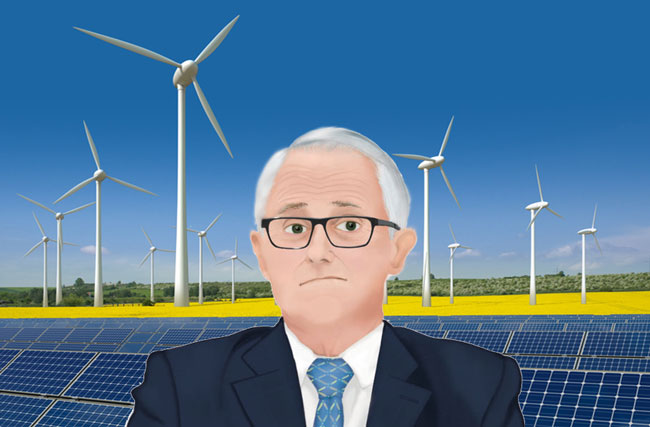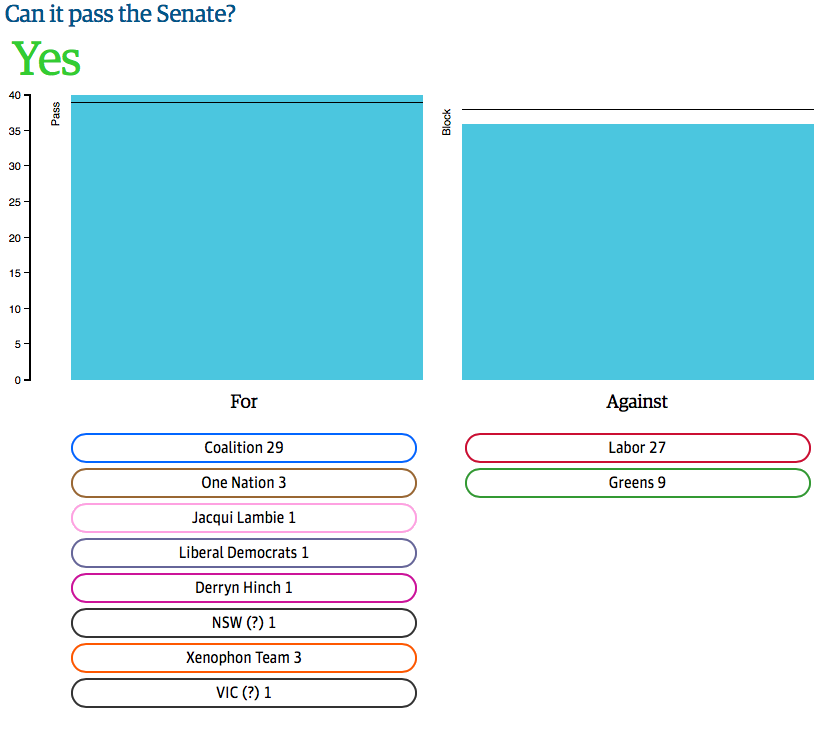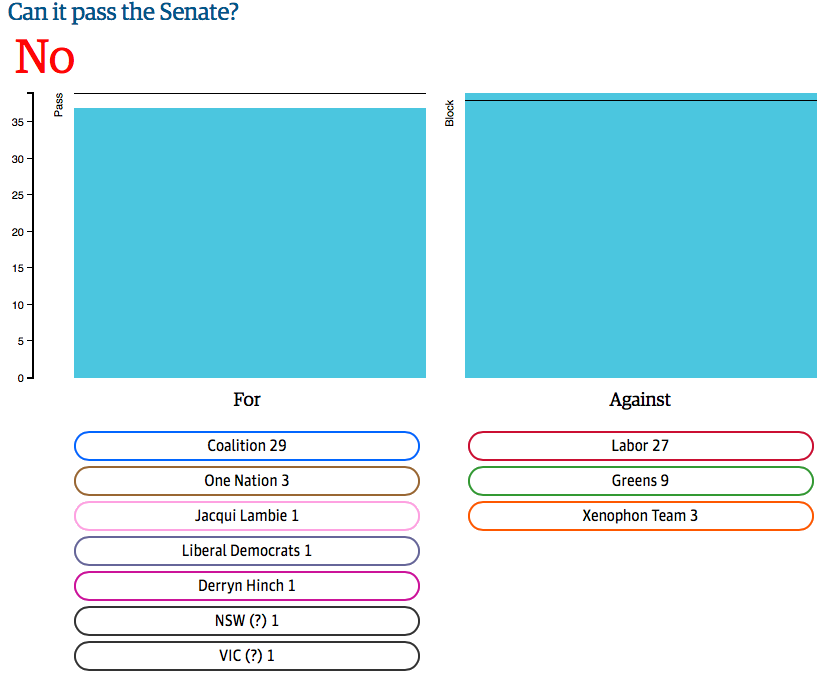
Turnbull’s submission to the right on issues such as renewable energy has not worked out so well for him.
Ah yes. Turnbull’s big gamble of calling a double dissolution election to regain control of policy looks like it’s failed. And failed miserably. Not only has the Coalition been stymied in its attempt to gain control of the Senate, it hasn’t yet been confirmed as having enough seats to govern in its own right in the Lower House.
For the solar industry this is most likely good news. A Liberal controlled upper and lower house would almost certainly have resulted in another attempt to kill the Renewable Energy Target, and with it the solar rebate. That is unlikely to happen now.
Will the new senate block anti-renewable legislation?
Using The Guardian’s nifty senate majority calculator we can see that it will be very hard to get anti renewable legislation through the senate, unless Nick Xenophon votes with the Coalition.
Looking at the energy policies of One Nation (hilarious – well worth a read), Jacqui Lambie and The Liberal Democrats, we can definitely put them in the Anti-Renewables column, along with the Coalition.
And we can definitely count on Labor and The Greens voting to block anti-renewable bills.
Worst Case Scenario – NXT vote to cripple or kill the RET
What we don’t know is how NXT or the two unknown Senators will vote. Nick Xenophon has a moderately anti-renewable voting record. And he’s well known for being anti-wind.
If we put NXT in the left hand column, we can see anti-renewable legislation being passed:

If NXT and the unknowns vote with the government, the RET and solar rebate could be toast. (calculator from the Guardian)
Renewables are safe – if NXT votes for them.
But if NXT vote for renewables, then no matter what the unknown senators do – renewables will be safe:

If NXT vote for renewables – they should be safe.
If NXT go all anti renewable on us then we’d need both the unknowns in the right hand column for renewables to be safe.
The Lower House
Although the most likely scenario in the Lower House is a slender — or minority — Coalition victory, nothing is off the table and the electorate won’t find out the final result until at least Tuesday.
During the night (while flipping channels from Le Tour) I was most struck by the angry, bitter speech from the prime minister at 12.30 am who despite apparently winning, appeared to be regretting his decision to take the country to a vote. At a time when party leaders traditionally put aside differences to unite the country, the PM tore into the Labor party, seeming to wish to divide the country even further with a speech that was as shrill as it lacked humility.
Was this the very definition of a Pyrrhic victory? Hasn’t he got the message from the voters yet? Perhaps the tone was more a reflection of a man under threat of losing his job.
Political guru Laurie Oakes for one, was not impressed.
Judge for yourself if you were watching Le Tour at the time.
My theory for this bitterness, bordering on white-hot anger from the under-fire PM, was that he now deeply regrets selling out his relatively progressive ideals for a shot at power. Betraying the people’s trust in his relative open-mindedness has been for nothing it seems, almost certainly delivering Australia a more unstable government in the process for the next three years.
Turnbull’s capitulation to the anti-renewables mob fails to pay off
Cast your minds back to September 2015 when Malcolm-in-the-Middle rolled one of the most unpopular and virulently anti-renewable prime ministers that ever pulled on a hi-vis vest. The replacement of Tony Abbott with Malcolm Turnbull struck an immediate chord with voters with Turnbull’s approval ratings rocketing and his Coalition party’s standings in opinion polls rising to winning levels not seen since before Tony.
It seemed as if the installation of a progressive, central PM who was committed to such ideals as same-sex marriage, renewable energy and climate change would herald a new dawn in Australian politics. The nation, almost perceptively, breathed a collective sigh of relief. The Lib/Nats went, as the saying goes, from feather duster to rooster almost overnight.
How wrong we were as now-PM Turnbull decided to acquiesce to the anti-renewables right on almost every issue. From water policy to climate change, same-sex marriage and renewable energy. Even the republic. Malcolm Turnbull’s government has been almost a carbon copy of his predecessor in style and policy. A disaster.
This wasn’t what we thought would happen when we cheered Malc’s toppling of anti-renewable Tony.
As a consequence of Turnbull’s submission to the right wing, his popularity waned dramatically amongst the electorate. Instead of seeing him as a type of intelligent, progressively-inclined saviour of the nation, they now looked upon him as a better-dressed and wealthier version of Abbott.
Turnbull’s ploy, to sell out to the less progressive wing, has resulted in humiliation. My theory is that the angry speech demonstrates that he is regretting his sell out. The interest — or horror— of the coming term may be to see if Turnbull, if he stays as PM, will lurch further to the right or decide it’s not worth it and follow the Australian people on issues such as climate change and renewable energy. In other words a return to the Malcolm #1.
What are your thoughts on the make-up of the new parliament? Is the closeness of the votes in both Houses a good or bad thing for renewable energy policy? Do we really get the politicians we deserve? Am I being too harsh on Malcolm-Formerly-in-the-Middle? Where will the NXT clan vote on Renewables? Love to hear your points of view.

 RSS - Posts
RSS - Posts



I’m hoping the RET gets axed.
Why’s that Tom? Do you want higher electricity prices, more particulate pollution, more CO2 emissions and more profits for the big 3 Gentailers?
Like, like, like.
Good article Finn.
Yes, Nick Xenephon really is key here. His anti-wind inclinations are a real worry. Not sure where he sits re: solar or microgrids though.
Just back from Denmark and was very happy to see a lot of windmills which was totally destroying the landscape there have now been replaced with much bigger, more powerful and out of sight windmills- I stood next to a couple 220 meters high, and I couldn’t even hear them—Still dont like them, much prefer
solar panels on houses.
Also came across earth heating in private houses, taking advantage of the difference in the temperature below ground level, impressive but I think very expensive to install, at least the machinery required
to run the system was very big